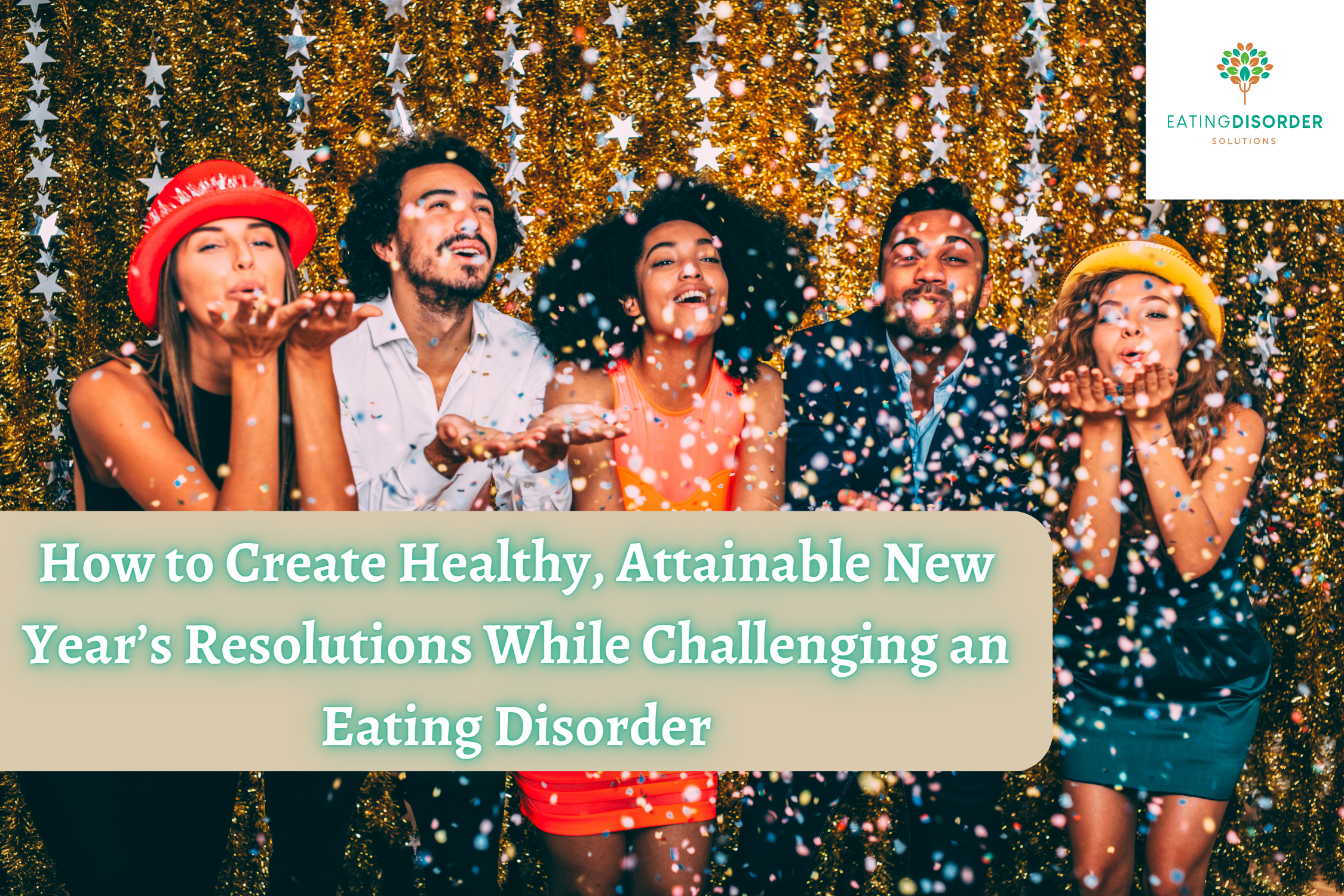Whether you’re reading this before the new year bell has rung or you’ve fallen upon this two weeks into the new year, you need to know one thing: every day is a chance for you to start anew. It doesn’t just have to be in the new year.
However – we all know it’s coming. With the new year come the New Year’s resolutions. Many will focus on losing weight. It’s not hard to notice how obsessed our society is with diet culture. If you’re on social media, you’ll see the onslaught of posts about the latest diet a friend on Facebook might be trying or the influx of pictures of people at the gym with their brand new memberships. This diet culture, however, values “health” most, a term that refers to unrealistic, idealized bodies pushed to their limit. In fact, among Americans who made New Year’s resolutions in 2019, 50% focused on exercising more, 43% on eating healthier, and 37% on losing weight.
New Year’s resolutions can be inspiring, but they can be stressful for those with eating disorders. Eating-disordered behaviors can be triggered by stress, especially when family and friends start talking about the latest diet fad or going to the gym more often.
These resolutions aren’t an option for someone in eating disorder recovery – at least not from a recovery-oriented perspective. Even for those who are not in recovery, it’s not necessarily a healthy, balanced choice. In anyone who sets strict diet and exercise guidelines, disordered eating behaviors can begin to surface.
During this time, you need to remember what is most important to you and your life goals – not others. We all need to take a step back sometimes, marinate on what we find most valuable, and then take action to move toward it. How can one deal with diet-obsessed culture and New Year’s resolutions in eating disorder recovery? First, focus on the things that CAN be controlled.
The Burden of a New Year
Eating disorder recovery does not exclude people from making New Year’s resolutions. However, the most beneficial approach is keeping resolutions realistic and rewarding instead of stressful and challenging.
Don’t:
-
- Make resolutions about weight loss, eating, or exercise
- Make them about body size or shape
- Make them about appearance
Do make resolutions that relate to eating disorder recovery, such as:
-
- Staying connected to a support system
- Communicating with family and friends
- Attending all scheduled counseling sessions or meetings at eating disorder treatment centers
- Staying patient during the recovery process
- If necessary, consider residential programs
Making S.M.A.R.T. goals
The best kind of goals are S.M.A.R.T. goals: Specific, Measurable, Achievable, Realistic, and Time-Bound. Setting goals helps you stay focused, motivated, and reasonable. This is empowering and may motivate you to develop and accomplish the next realistic goal.
The list of non diet-related goals is long: improving relationships, learning new skills, returning to school, or applying for a job you’ve always wanted. The plans you set are up to you. There are many recovery-focused goals, including:
-
- Challenging specific fear foods
- Making goals related to body checking
- Managing your emotions through daily journaling
- Attending therapy for the first time or continuing to do so
- Getting higher level treatment, if necessary, for an eating disorder
- Enhancing your interpersonal relationships during recovery
- Improving your coping skills by learning and using new ones
There are many possibilities for you in the new year – you can make resolutions that have nothing to do with diet culture. Instead, resolutions should be personal and can relate to your recovery or something you’ve always wanted to do. Even if you struggle with an eating disorder, you can start making changes at any point in the year.
Many resolutions are separate from diets or altering one’s appearance. In addition, making favorable resolutions can be helpful for those who have recently completed eating disorder treatment to create new habits that support long-term recovery. The right resolutions can inspire you to make positive lifestyle changes, provided that your resolutions are manageable and reasonable.
New Year’s Resolutions to Try
Growth, more often than not, is hard to quantify. Even if you did not grow in the way you expected yourself to this year, each year naturally brings about some form of change within yourself. Whether you believe in setting New Year’s resolutions or not, be proud of the lessons you have learned in the past year. Instead of shaming yourself to change, challenge yourself to grow in the upcoming year by trying out some of these options:
1. Listening to your body
This may sound like an easy task, but it’s much more complex than it sounds. In addition to reducing stress and anxiety, mindfulness promotes better sleep and boosts immunity. You can become more mindful through meditation, yoga, and progressive muscle relaxation, which can be excellent New Year’s resolutions.
2. Taking time for self-care
Everyone in the modern world is busy. Finding “me time” can be challenging when you’re raising a family, working, going back to school, starting a business, or just trying to plan for your future. The greater your ability to listen to your body, the easier it becomes to take better care of yourself. The pace of life may not slow down, but try to find time for self-care. Whether watching Netflix or booking a day at the spa, this can be as simple or as elaborate as you like.
3. Trying something new
The ability to learn a new skill can be invaluable in life. The new year is a great time to try something new each month to stay active and become more mindful, whether it is woodworking or joining a book club. Discover activities that inspire you, cultivate your creativity, and open up a new world.
4. Practicing gratitude
Gratitude has been shown to boost positive emotions, help people handle adversity better, improve mental and physical health, and reduce the risk of heart attacks. The many benefits of gratitude can be experienced by making daily gratitude lists, keeping a gratitude journal, or volunteering.
5. Taking a break from social media
The use of social media has pros and cons, but taking a break from Facebook, Instagram, and other popular apps in the new year may be beneficial. If you have negative thoughts and feelings, why not take a break or unfollow accounts that bring them?
6. Celebrating your body with movement
Human bodies are engineering marvels capable of incredible feats. People who have recovered from eating disorders can benefit significantly from celebrating their bodies and all that they are capable of through positive movement. A resolution focusing on dance, yoga, Zumba, tai chi, boxing, or another enjoyable movement practice can be a fun and interactive way to practice gratitude for your body.
7. Continuing to work with your support group
Everyone experiences change during the new year, and this change can be precisely what is needed to keep those in recovery on track. However, too much difference at once can make it challenging to stay on track with recovery goals. Therefore, it can be beneficial for someone to set a new year’s resolution to continue working with their eating disorder recovery team. In addition, setting goals can help individuals maintain communication with their recovery team, attend appointments, and develop a supportive social network at home.
Eating Disorder Treatment at Eating Disorder Solutions
At Eating Disorder Solutions, we help guide adults through the recovery process with compassion. Our trained and experienced staff members provide the medical and psychiatric care you need outside of a hospital setting. The mindfulness practices that underpin our eating disorder recovery programs are based on the belief that everyone can have a healthy relationship with food and their bodies.
Our mission is to help our clients develop positive behaviors regarding food, nutrition, and movement, breaking them free from negative habits. In contrast to many other traditional eating disorder recovery programs, Eating Disorder Solutions offers highly customized treatment based on each individual’s needs, diagnosis, challenges, and strengths. Call today for a free consultation at 855-808-4213 to begin your best new year’s resolution yet: recovery.
Sources:



